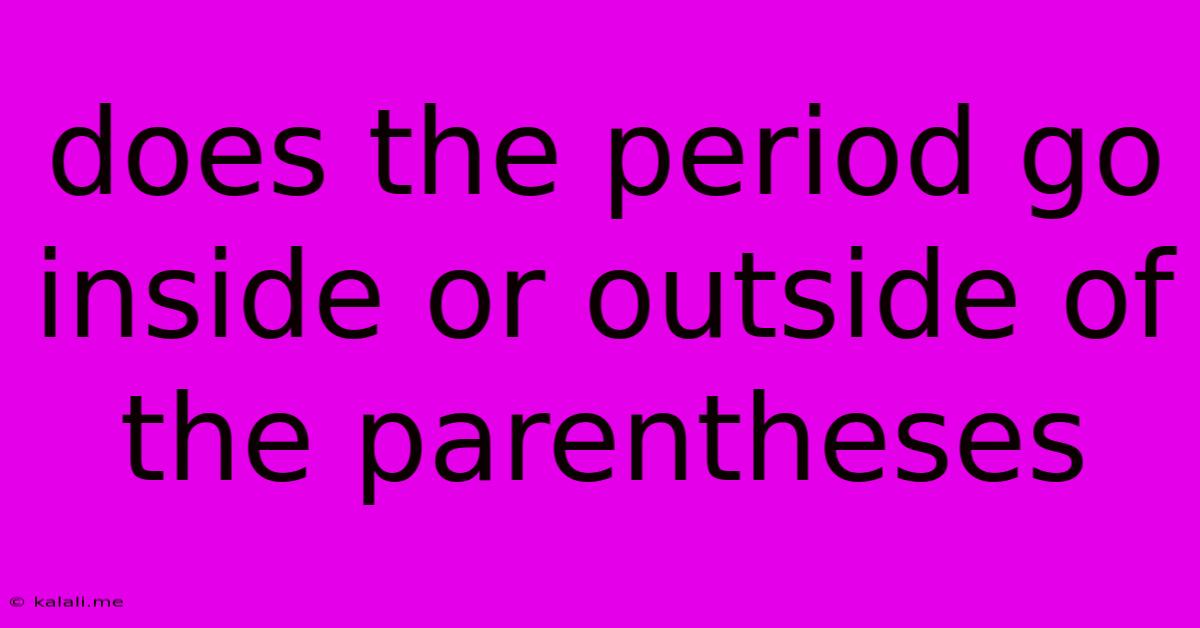Does The Period Go Inside Or Outside Of The Parentheses
Kalali
May 23, 2025 · 3 min read

Table of Contents
Does the Period Go Inside or Outside the Parentheses? A Definitive Guide
This seemingly simple question about punctuation has baffled writers for years. Where should that period go – nestled inside the parentheses or perched proudly outside? The answer, thankfully, isn't as complicated as you might think, but understanding the nuances will elevate your writing clarity and professionalism. This guide will provide a definitive answer, along with helpful examples and exceptions.
The Rule: The period generally goes inside the parentheses only if the entire sentence is enclosed within the parentheses. If the parenthetical element is merely an aside or interruption within a larger sentence, the period stays outside.
When the Period Goes Inside
This scenario occurs when the parenthetical phrase constitutes a complete sentence. Observe the following example:
- (The meeting has been postponed until next week.) We will send out a new notification soon.
In this case, the information within the parentheses is a complete, grammatically correct sentence. Therefore, the period appropriately resides inside the closing parenthesis. This keeps the sentence within the parentheses self-contained and grammatically correct.
When the Period Goes Outside
The more common situation involves a parenthetical phrase that interrupts a larger sentence. Here's how it works:
- The team completed the project (with minimal hiccups) on time.
Here, "(with minimal hiccups)" acts as a nonrestrictive phrase modifying the main clause. The main sentence remains grammatically correct without the parenthetical element, and the period sits neatly outside the closing parenthesis.
Exceptions and Nuances
While the above rules generally hold true, there are subtle exceptions to consider:
-
Sentence Fragments: If the parenthetical element is a sentence fragment, the period still goes outside. For example:
- The presentation was excellent (a truly impressive feat).
-
Lists and Enumerations: Punctuation within parentheses for listed items or enumerated points follows the punctuation rules for lists rather than the general parenthesis rules. Periods, commas, or other punctuation marks might be placed inside or outside depending on the overall list structure.
-
Other Punctuation Marks: If other punctuation marks (like question marks or exclamation points) are relevant to the parenthetical element itself, they remain inside the parentheses.
- Did you see the movie (the one with the amazing special effects!)?
Improving Clarity and Consistency
Correctly placing periods in relation to parentheses significantly improves the clarity and overall professionalism of your writing. Inconsistent punctuation can confuse readers and undermine the credibility of your work. By adhering to the rules above, your writing will demonstrate a keen attention to detail and a command of grammar.
Beyond the Period: Other Punctuation
The principles guiding period placement within parentheses largely apply to other punctuation marks as well. Consider the context and whether the parenthetical element is a complete sentence or an aside. This consistent approach ensures grammatical accuracy and readability.
In conclusion, while seemingly minor, mastering this punctuation detail elevates your writing's professionalism. By consistently applying these rules, you ensure clarity and grammatical accuracy, reinforcing your credibility as a writer. Remember to always prioritize clear communication—and correct punctuation plays a crucial role in that process.
Latest Posts
Latest Posts
-
Missing Number Treated As Zero Subfigure
May 24, 2025
-
Why Are My Led Bulbs Flickering
May 24, 2025
-
How To Align Double Sided Printing
May 24, 2025
-
Laplace Transform Of Distribution As N Goes Infinity
May 24, 2025
-
Is Israel Still Gods Chosen People
May 24, 2025
Related Post
Thank you for visiting our website which covers about Does The Period Go Inside Or Outside Of The Parentheses . We hope the information provided has been useful to you. Feel free to contact us if you have any questions or need further assistance. See you next time and don't miss to bookmark.